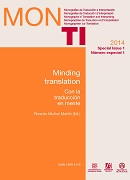Challenges of translation process research at the workplace
Contenido principal del artículo
Resumen
Descargas
Detalles del artículo
La propiedad intelectual de los artículos pertenece a los autores y los derechos de edición y publicación, a la revista. Los artículos publicados en la revista podrán ser usados libremente para propósitos educativos y científicos, siempre y cuando se realice una correcta citación del mismo. Cualquier uso comercial queda expresamente penado por la ley.
Citas
Asadi, Paula & Candace Séguinot. (2005) “Shortcuts, strategies and general patterns in a process study of nine professionals.” Meta 50:2, pp. 522–547. Electronic version available at: http://www.erudit.org/revue/meta/2005/v50/n2/010998ar.pdf
Atkinson, Paul Anthony; Amanda Coffey; Sara Delamont; John Lofland & Lyn Lofland (eds.) (2001) Handbook of Ethnography. London: Sage.
Brunette, Louise; Chantal Gagnon & Jonathan Hine. (2005) “The GREVIS project: Revise or court calamity.” Across Languages and Cultures 6:1, pp. 29–45.
Campbell, Stuart & Berta Wakim. (2007) “Methodological questions about translation research.” Target 19:1, pp. 1–19.
Cao, Deborah & Xingmin Zhao. (2008) “Translation at the United Nations as specialized translation.” Journal of Specialised Translation 9, pp. 39–54. Electronic version available at: http://www.jostrans.org/issue09/art_cao.pdf
Christensen, Tina P. (2011) “Studies on the mental processes in translation memory-assisted translation – The state of the art.” Trans-Kom 4:2, pp. 137–160. Electronic version available at: http://www.transkom.eu/bd04nr02/transkom_04_02_02_Christensen_Translation_Memory.20111205.pdf
Cravo Ana & Josélia Neves. (2007) “Action research in translation studies.” The Journal of Specialised Translation 7, pp. 92–107. Electronic version available at: http://www.jostrans.org/issue07/art_cravo.pdf
Désilets, Alain; Christiane Melançon; Geneviève Patenaude & Louise Brunette. (2009) “How translators use tools and resources to resolve translation problems: An ethnographic study.” MT Summit XII – Workshop: Beyond Translation Memories: New Tools for Translators MT. Electronic version available at: http://www.mt-archive.info/MTS-2009-Desilets-2.pdf
Ehrensberger-Dow, Maureen & Gary Massey. (2013) “Indicators of translation competence: Translators’ self-concepts and the translation of titles.” Journal of Writing Research 5:1, pp. 103–131. Electronic version available at: http://www.jowr.org/articles/vol5_1/JoWR_2013_vol5_nr1_Ehrensberger-Dow_Massey.pdf
Ehrensberger-Dow, Maureen & Daniel Perrin. (2013) “Applying newswriting process research to translation.” Target 25:1, pp. 77–92.
Englund Dimitrova, Birgitta. (2005) Expertise and Explicitation in the Translation Process. Amsterdam: John Benjamins.
Göpferich, Susanne. (2008) Translationsprozessforschung. Tübingen: Narr.
Göpferich, Susanne. (2009) “Towards a model of translation competence and its acquisition: The longitudinal study TransComp.” In: Göpferich, Susanne; Arnt L. Jakobsen & Inger M. Mees (eds.) 2009. Behind the Mind. Methods, Models and Results in Translation Process Research. Copenhagen: Samfundslitteratur, pp. 17–43.
Gouadec, Daniel. (2007) Translation as a Profession. Amsterdam: John Benjamins.
Hébert-Malloch, Louise. (2004) “What do we know about a translator’s day?” Meta 49:4, pp. 973–979. Electronic version available at: http://www.erudit.org/revue/meta/2004/v49/n4/009805ar.pdf
Holz-Mänttäri, Justa. (1984) Translatorisches Handeln. Theorie und Methode. Helsinki: Suomalainen Tiedeakatemia.
Karamanis, Nikiforos; Saturnino Luz & Gavin Doherty. (2011) “Translation practice at the workplace. Contextual analysis and implications for machine translation.” Machine Translation 25:1, pp. 35–52.
Katan, David. (2009) “Translation theory and professional practice: A global survey of the great divide.” Hermes – Journal of Language and Communication Studies 42, pp. 111–153. Electronic version available at: http://download1.hermes.asb.dk/archive/download/Hermes-42-7-katan_net.pdf
Koskinen, Kaisa. (2008) Translating Institutions. An Ethnographic Study of EU Translation. Manchester: St. Jerome Publishing.
Kuznik, Anne & Joan M. Verd. (2010) “Investigating real work situations in translation agencies. Work content and its components.” Hermes – Journal of Language and Communication Studies 44, pp. 25–43. Electronic versión available at: http://download2.hermes.asb.dk/archive/download/Hermes-44-kuznik%26verd.pdf
Lafeber, Anne. (2012) “Translation skills and knowledge – Preliminary findings of a survey of translators and revisers working at inter-governmental organizations.” Meta 57:1, pp. 108–131.
Leblanc, Matthieu. (2013) “Translators on translation memory (TM). Results of an ethnographic study in three translation services and agencies.” Translation & Interpretation 5:2, pp. 1–13. Electronic version available at: http://www.transint.org/index.php/transint/article/view/228/134
Martin, Tim. (2007) “Managing risks and resources: A down-to-earth view of revision.” The Journal of Specialised Translation 8, pp. 57–63. Electronic versión available at: http://www.jostrans.org/issue08/art_martin.pdf
Massey, Gary & Maureen Ehrensberger-Dow. (2011a) “Investigating information literacy: A growing priority in translation studies.” Across Languages and Cultures 12:2, pp. 193–211.
Massey, Gary & Maureen Ehrensberger-Dow. (2011b) “Commenting on translation: Implications for translator training.” Journal of Specialised Translation 16, pp. 26–41. Electronic version available at: http://www.jostrans.org/issue16/art_massey_ehrensberger_dow.php
Mossop, Brian. (2007) Revising and Editing for Translators. 2nd Ed. Manchester: St. Jerome.
Muñoz Martín, Ricardo. (2010) “The way they were: Subject profiling in translation process research.” In: Mees, Inger M.; Fabio Alves & Susanne Göpferich (eds.) 2010. Methodology, Technology and Innovation in Translation Process Research: A Tribute to Arnt Lykke Jakobsen. Frederiksberg: Samfundslitteratur, pp. 87–108.
Muñoz Martín, Ricardo. (2012a) “Just a matter of scope. Mental load in translation process research.” Translation Spaces 1, pp. 169–188.
Muñoz Martín, Ricardo. (2012b) “Standardizing translation process research methods and reports.” In: García Izquierdo, Isabel & Esther Monzó Nebot (eds.) 2012. Iberian Studies on Translation and Interpreting. Bern: Peter Lang, pp. 11–22.
O’Brien, Sharon. (2012) “Translation as human-computer interaction.” Translation Spaces 1, pp. 101–122.
PACTE. (2003) “Building a translation competence model.” In: Alves, Fabio (ed.) 2003. Triangulating Translation. Perspectives in Process Oriented Research. Amsterdam: John Benjamins, pp. 43–66.
PACTE. (2011) “Results of the validation of the PACTE translation competence model. Translation Problems and translation competence.” Alvstad, Cecilia; Adelina Hild & Elisabet Tiselius (eds.) 2011. Methods and Strategies of Process Research. Amsterdam: John Benjamins, pp. 317–343.
Risku, Hanna. (2002) “Situatedness in translation studies.” Cognitive Systems Research 3, pp. 523–533.
Risku, Hanna. (2009) Translationsmanagement. Interkulturelle Fachkommunikation im Informationszeitalter. 2nd Ed. Tübingen: Narr.
Risku, Hanna. (2010) “A cognitive scientific view on technical communication and translation. Do embodiment and situatedness really make a difference?” Target 22:1, pp. 94–111.
Robert, Isabelle S. (2008) “Translation revision procedures: An explorative study.” In: Boulogne, Pieter (ed.) 2008. Translation and Its Others. Selected Papers of the CETRA Research Seminar in Translation Studies 2007. Electronic versión available at: http://www2.arts.kuleuven.be/info/bestanden-div/Robert.pdf
TEI (2008) TEI P5: Guidelines for Electronic Text Encoding and Interchange. Electronic version available at: http://www.tei-c.org/release/doc/tei-p5-doc/en/html/


